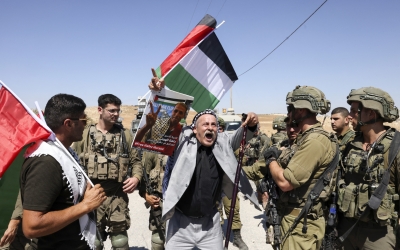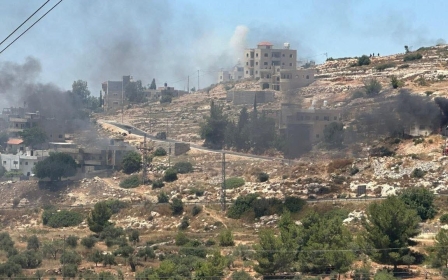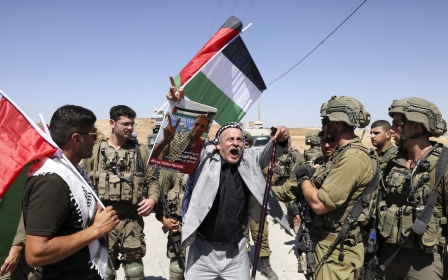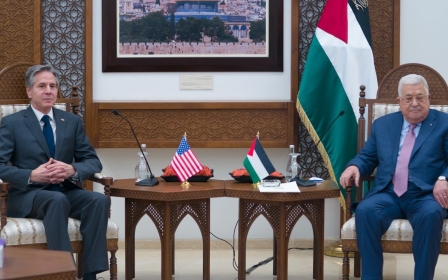On the question of the Palestinian Authority, Israel's security institutions diverge
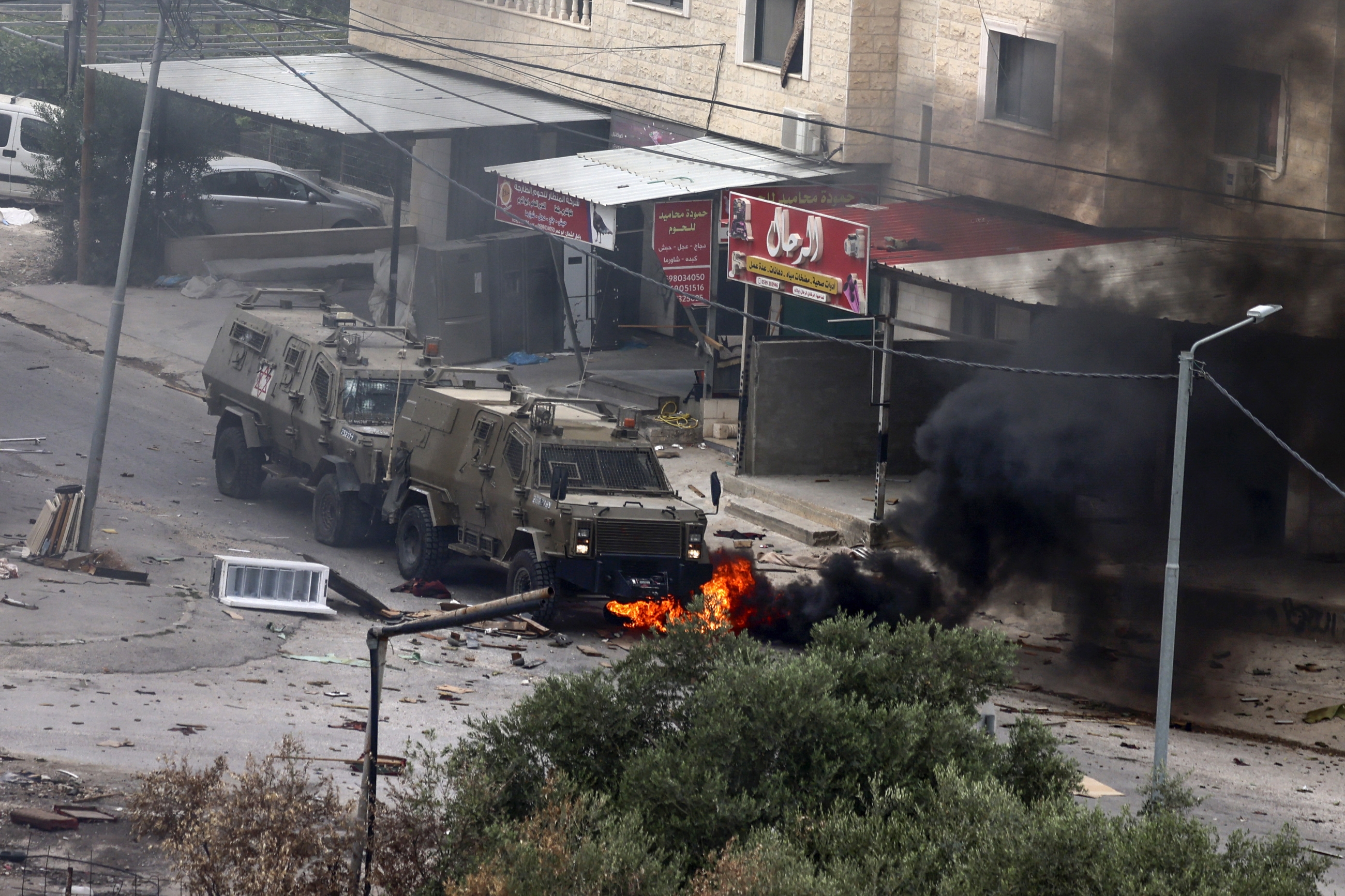
With the influence of the current Shin Bet chief, Ronen Bar, growing, there has been a noticeable divergence between the Israeli security agency and the military.
This strategic divide - recently underscored by the 19 June Israeli army raid in Jenin - centres on two issues: the approach towards the Palestinian Authority (PA) and the question of incursions into Palestinian cities, especially in the northern area of the West Bank.
The Shin Bet is in favour of invading Palestinian cities and destroying any new formations of resistance groups. However, its failure to detect potential threats ahead of the military's raid led to surprise attacks and the destruction of armoured vehicles by roadside bombs.
The Israeli military, on the other hand, had reservations about conducting raids in the West Bank. In their view, contrary to the situation in 2003, in which the PA supported the Second Intifada, triggering the Israeli invasion of West Bank cities, the PA has since made a complete about-face.
The military believes that a strong PA plays a pivotal role in maintaining security for Israel and controlling Palestinian activities. This is the position the Shin Bet also held until recently.
New MEE newsletter: Jerusalem Dispatch
Sign up to get the latest insights and analysis on Israel-Palestine, alongside Turkey Unpacked and other MEE newsletters
Settler rampages
Since the far-right government took power, there has been a marked shift in Israeli policy towards the West Bank. Aside from military affairs, all matters concerning the occupied territory fall under the jurisdiction of Religious Zionism party leader and Minister of Finance Bezalel Smotrich.
Smotrich, a potent figure in the government, is strategically focused on dissolving the Palestinian Authority
This shift is in accordance with the coalition agreements, which drive the government's agenda.
Smotrich, a potent figure in the Israeli government, is strategically focused on dissolving the PA. In line with his strategic doctrine of establishing "Jewish sovereignty" over the entire land of Palestine, he advocates for the invasion of cities and camps to secure decisive outcomes.
Israeli settlers act under the guidance of Smotrich, a far-right settler leader, who, in turn, works to shape government policies according to the settlers' will.
The Shin Bet maintains a watchful eye over the settlers' movements and plans and even has a department dedicated to this function. Originally named the "non-Arab department", it is now referred to as the Jewish department (across all state institutions and official literature, the term "non-Jews" is applied while in Shin Bet it's "non-Arabs"). However, no action is taken to thwart their activities or violence.
The Shin Bet's failure to control the settlers suggests that it sees a role in their violence: to establish dominance over the Palestinians, act as a deterrent and shatter any grassroots support for armed organisations resisting the occupation.
The recent savagery of the settlers is, therefore, the result of a measured and calculated strategy rather than a "bloody frenzy". It is a tactic to facilitate Israel's broader aims of intimidation and ethnic cleansing of Palestinians.
Recent examples include the incidents of arson in Huwwara, Turmus Ayya and Um Safa, which were not random, but rather, premeditated attacks.
The Israeli government's announcement of the construction of 1,000 housing units in the illegal settlement of Eli - following the Palestinian armed operation there - further highlight its colonial objectives in the West Bank.
Weakening the PA
Three months ago, as discord within the military ranks escalated over their opposition to the potential judicial coup, key voices of the Israeli army emerged. Among them was the military commander and former head of the Shin Bet, Nadav Argaman. Their unambiguous stance: If government policies conflict with the rule of law, the military's allegiance will be to the latter.
However, the military's actions now appear to be at odds with its previous stance. Rather than adhering to the letter of the law, the military seems to be acting in lockstep with the government's decrees.
This shift has been particularly evident in the case of the illegal Evyatar outpost in the West Bank, which was evacuated by the order of the Israeli court. In defiance of this order, settlers returned and resumed their residency, seemingly unhindered by the military despite the area's status as a military zone.
This development contradicts the military's own position and assessments. The military has expressed a reluctance to invade Palestinian cities, understanding that this would require it to play a greater policing role post-invasion.
Moreover, it added that such a move would deplete resources currently being marshalled against Iran, Syria, and Hezbollah.
It is for these reasons that nearly all former military leaders, joined by all past security agencies, stand in opposition to the weakening (or total collapse) of the Palestinian Authority. On the contrary, they perceive this weakening as a strategic loss for Israel, which doesn't put forward any tangible solution for peace.
Yet a significant shift in stance can be observed within the ranks of the Shin Bet, even if this shift does not represent a consensus within the organisation.
The director of Shin Bet acknowledges that a northern West Bank invasion could potentially destabilise the PA, yet he advocates for a short-term invasion that does not plan for what would happen in its aftermath. Recognising the inherent uncertainty of war, he acknowledges that he cannot dictate the duration of an invasion.
Bar further recognised that the arson attack on Turmus Ayya was a tremendous blow to the PA's credibility - an advantage to the Shin Bet. Palestinian communities have critiqued the "negligence" of the PA and its failure to protect them from settler attacks, especially in Area C, which is fully controlled by Israel.
In a rare departure from the norm, the Shin Bet dispatched a representative to the Knesset committee responsible for settlement projects. The representative, speaking from behind a curtain, voiced the agency's support for a proposed bill that would expand Jewish presence in Palestinian-majority cities within Israel such as Galilee.
This representative asserted that the "Judaisation" of Galilee is, in fact, an issue of national security. He added: "The level of settlement in the area brings with it more police and enforcement forces, education, road development, and more."
For the Shin Bet, the settler attack on Turmus Ayya was a tremendous blow to the PA's credibility, an advantage to Israel
He further suggested that the Shin Bet would work to guard the Jewish communities from potential threats, viewed as adversarial to the state. This policy includes strategies to dilute the significant Arab presence in Galilee and to disrupt its continuity.
The aims of the bill supported by the Shin Bet agent are outlined as tenets of the coalition government's agreement, concerning the "Judaisation" of not only Galilee, but also the Naqab, Area C in the West Bank, and Jerusalem.
Finally, the Shin Bet representative, choosing to remain unnamed, corroborated this as the viewpoint of Bar, the agency's head. This revelation could signal the intelligence organisation's potential tilt towards ministerial
policies, or at the very least, suggest a growing congruity in their strategic assessments.
Divergence
In the wake of the arson attack on Turmus Ayya on 21 June, Israeli forces claimed that they had not received prior knowledge about the settlers' intentions to invade the town. Usually, such intelligence comes from the Shin Bet.
However, certain segments within the army, most notably the West Bank battalion (officially recognised as Judea and Samaria division), are heavily influenced by the ideology of Religious Zionism. Those soldiers and officers do not strictly adhere to the orders of the general staff and instead perceive themselves and the settlers to be a unified body - as their commander, Col Roi Zweig, stated last year.
The internal chaos manifested itself when terrorist settler gangs carried out the arson attack under the protective umbrella of the military and under its watchful eye. This occurred after the town was put under siege, with all access points in and out effectively blocked. This tactic harks back to a historical Zionist tactic that has been associated with other tragic massacres.
The divergence between the Israeli military and the Shin Bet threatens to upset a long-standing equilibrium among Israel's primary security institutions - the army, the Shin Bet and the Mossad - and the government. Whether it's matters concerning Iran or Palestine, what has always been the decisive factor is the consensus among these three security agencies.
Interestingly, the Shin Bet appears to be shifting closer to the government's far-right position, aligning specifically with Smotrich. Smotrich is seemingly convinced that undermining the PA is a necessary step to facilitate the projects of the ruling party he leads. (National Security Minister Itamar Ben Gvir has become a voice that no one listens to when it comes to security issues.)
The debate within the security apparatus of the occupying state about whether it should destabilise the PA is yet to be settled. Despite years of besieging the PA, Israel's desire to cause its total collapse is uncertain.
However, distinct support for this strategy seems to be growing based on numerous assessments about the era to follow 87-year-old President Mahmoud Abbas. The question of the post-Abbas landscape is one that is thoroughly preoccupying all facets of the machinery of the occupying state.
Despite years of besieging the PA, Israel's desire to cause its total collapse is uncertain
As the situation evolves, it's becoming increasingly evident that the Shin Bet is focused not only on severing the bonds and expectations that exist between Palestinians living in Area C and the PA, but also on exacerbating the local residents' complaints against the governing body.
The PA, inhibited by Israeli restrictions, is unable to provide any form of protection or take action in the region. These realities will likely tilt the scales in favour of those within Israel who are keen on weakening - or destroying - the PA.
The views expressed in this article belong to the author and do not necessarily reflect the editorial policy of Middle East Eye.
Middle East Eye delivers independent and unrivalled coverage and analysis of the Middle East, North Africa and beyond. To learn more about republishing this content and the associated fees, please fill out this form. More about MEE can be found here.



